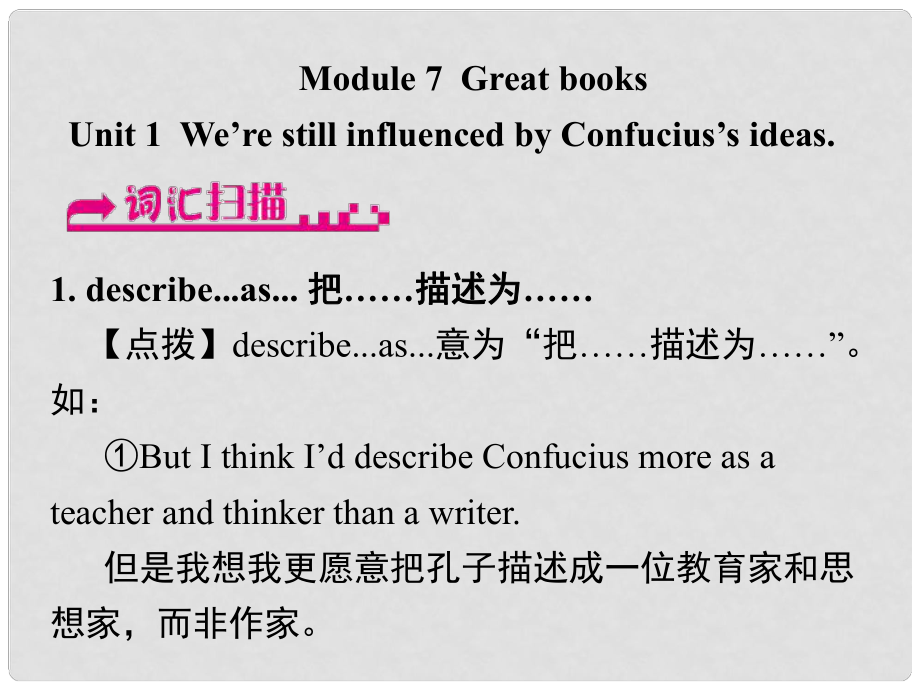《浙江省嘉興市秀洲區(qū)九年級(jí)英語上冊(cè) Module 7 Unit 1 We’re still influencedConfucius’s ideas課件 (新版)外研版》由會(huì)員分享��,可在線閱讀�,更多相關(guān)《浙江省嘉興市秀洲區(qū)九年級(jí)英語上冊(cè) Module 7 Unit 1 We’re still influencedConfucius’s ideas課件 (新版)外研版(18頁(yè)珍藏版)》請(qǐng)?jiān)谘b配圖網(wǎng)上搜索。
1��、Module 7 Great booksUnit 1 Were still influenced by Confuciuss ideas.1. describe.as. 把把描述為描述為 【點(diǎn)撥】describe.as.意為“把描述為”�。如: But I think Id describe Confucius more as a teacher and thinker than a writer. 但是我想我更愿意把孔子描述成一位教育家和思想家�,而非作家。 After the operation, her condition was described as stable. 手術(shù)后�,她的狀況可
2、以說還算穩(wěn)定����。2. make sense 易理解����;合情理�����;有意義易理解�;合情理;有意義 【點(diǎn)撥】make sense意為“易理解�����;合情理�����;有意義”��。如: And Shakespeares plays also make a lot of sense to us today. 莎士比亞的戲劇現(xiàn)在對(duì)于我們來說也仍然很有意義�����。 Why did she do such a thing? It does not seem to make sense. 她為什么做這樣的事?似乎沒有道理���。3. by the way 順便提一下順便提一下 【點(diǎn)撥】by the way意為“順便問一句����;順便提一下”�,用來引出一
3、個(gè)與談話沒有直接關(guān)系的話題�����,在句中的位置較為靈活�����,可放在句首��、句中或句末��。如: I want to tell you about my travel plans, but, by the way, hows your mother? 我想告訴你我的旅行計(jì)劃�,但順便問一下,你母親怎么樣了��?4. maybe與與may be 【辨析】(1)maybe是副詞���,意為“也許�����;可能”�,在句中作狀語���,相當(dāng)于perhaps�����,常位于句首�����。如: Maybe shell come this afternoon. 她可能今天下午來���。 (2)在may be中,may是情態(tài)動(dòng)詞��,be是動(dòng)詞����,兩者構(gòu)成完整的謂語形式,與主語形
4、成系表結(jié)構(gòu)�����,意為“也許是����;可能是”。如: I cant find my watch. It may be in your pocket. 我找不到我的手表了�����,它可能在你的口袋里���。 (3)maybe和may be也可相互轉(zhuǎn)換���。如: He may be in the office. =Maybe he is in the office. 或許他在辦公室。5. receive, accept與與take 【辨析】receive, accept和take這三個(gè)詞都有“接受”的意思�����,但也有區(qū)別���。 (1)receive只表示被動(dòng)地接受����。如: She has received his present, bu
5����、t she will not accept it. 她收到了他的禮物,但她是不會(huì)接受的����。 (2)accept表示主動(dòng)而且高興地接受。如: The villagers have told him that they will not accept the inn even if he gives it away. 村民們告訴他說����,即使他把那小旅館白送給他們,他們也不會(huì)接受��。 (3)take所表示的接受包含著有人贈(zèng)給的意思����。如: Did you take his advice? 你接受他的建議了嗎? He takes anything he is given. 給他什么他就要什么��。 1. But
6��、I think Id describe Confucius more as a teacher and thinker than a writer. 但是我想我更愿意把孔子描述成一位教育家和思但是我想我更愿意把孔子描述成一位教育家和思想家����,而非作家��。想家����,而非作家���。 【點(diǎn)撥】more. than.意為“與其說是不如說是”����。如: Success is more hard work than good luck. 成功來自努力����,而非來自好運(yùn)氣。 He is more a scholar than a teacher. 與其說他是位教師����,不如說他是位學(xué)者。 【注意】該句型主要用于同一個(gè)人或物在兩個(gè)不
7��、同性質(zhì)或特征等方面的比較�,其中前面的比較級(jí)必須用加more的形式,不能用加詞尾-er的形式��。 2. Whats up? 怎么了?怎么了���? 【點(diǎn)撥】這是一種非正式用法����,意為“怎么了�����;出什么事了”�����。如: Whats up? You look so sad. 怎么了����?你看上去這么傷心����。 3. By the way, what do you think of Mark Twain, the great American writer in the nineteenth century? 順便問一下,你覺得十九世紀(jì)偉大的美國(guó)作家馬順便問一下��,你覺得十九世紀(jì)偉大的美國(guó)作家馬克克吐溫怎么樣�?吐溫怎么樣�����? 【
8��、點(diǎn)撥】(1)句型What do/does+主語+think of.?是用來問對(duì)方對(duì)某事物或某人的印象�、評(píng)價(jià)或看法的����,意為“某人覺得怎么樣”。如: What do you think of the new book? 你覺得這本新書怎么樣�����? What does she think of her English teacher? 她覺得她的英語老師怎么樣���? (2)回答時(shí)����,多闡明自己的看法或表明自己喜歡的程度��。常會(huì)用到下面的句型:主語+love(s)/like(s)/dont(doesnt) mind/dont(doesnt) like/ cant stand+賓語���。如對(duì)例句回答�����,要表明不介意�����、不反
9���、對(duì)這本新書時(shí),你可以說:I dont mind it.�;對(duì)例句回答,要表明她喜歡她的英語老師��,并說明原因�,你可以說:She likes her English teacher because her class is very interesting.。 (3)What do you think of.?的句型可以用How do you like.?的句型替換����。如例句可以轉(zhuǎn)換為:How do you like the new book?,其意思不變���。 對(duì)How do you like.?的句型進(jìn)行回答時(shí)��,除用(2)中的幾種方式外��,還可以根據(jù)情況用“主語+like(s)+賓語+very much
10����、(很/非常)/a little(有點(diǎn)兒).”或“主語+dont(doesnt) like+賓語+at all(一點(diǎn)也不).”的句型,分別表示“某人很(非常)/有點(diǎn)兒喜歡某人/某物”和“某人一點(diǎn)也不喜歡某人/某物”����。如: How do you like the popular singer? 你認(rèn)為這個(gè)流行歌手怎么樣? I like him very much. 我非常喜歡他�����。 How does she like the books? 她認(rèn)為這些書怎么樣�? She doesnt like them at all. 她一點(diǎn)都不喜歡它們。 4. .but I suppose he isnt as w
11�、ell-known as Confucius or Shakespeare. 但我認(rèn)為他沒有孔子和莎士比亞來得有名。但我認(rèn)為他沒有孔子和莎士比亞來得有名���。 【點(diǎn)撥】(1)suppose意為“猜想����;推測(cè)�;相信;認(rèn)為”,其常用搭配為:suppose+賓語+賓語補(bǔ)足語��;suppose+that從句�。如: I dont suppose he will agree. 我想他不會(huì)同意的。 What makes you suppose him to be connected with this case? 你怎么會(huì)認(rèn)為他與這個(gè)案子有聯(lián)系呢��? (2)as.as用于比較句型����,中間插入的是形容詞或副詞的原級(jí),表示“達(dá)到與相同的程度”�。如: He is as strong as a horse. 他力大如牛。 The tree is as tall as the building. 這棵樹和那棟樓一樣高���。
 浙江省嘉興市秀洲區(qū)九年級(jí)英語上冊(cè) Module 7 Unit 1 We’re still influencedConfucius’s ideas課件 (新版)外研版
浙江省嘉興市秀洲區(qū)九年級(jí)英語上冊(cè) Module 7 Unit 1 We’re still influencedConfucius’s ideas課件 (新版)外研版

